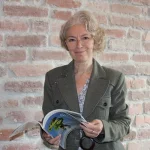
The Fulbright Programme provides competitive, merit-based grants for international educational exchange for students, scholars, teachers, professionals, scientists and artists. The programme was founded by US Senator J. William Fulbright in 1946.
Under the Fulbright Programme, competitively selected US citizens can be granted scholarships to study, conduct research or exercise their talents abroad; and citizens of other countries may qualify to do the same in the US.
The Fulbright Programme provides 8,000 grants annually to those undertaking graduate study, advanced research, university lecturing and classroom teaching.
Citizens of about 160 countries in the world can benefit from those scholarships.
The programme is sponsored by the US Department of State, Bureau of Educational and Cultural Affairs and is administered in partnership with the Institute of International Education.
Outside of the US the programme is administered by bi-national organisations usually called Fulbright Commissions or organisations for educational exchange. Their names vary per country – for example American-Indonesian Exchange Foundation, Bulgarian-American Commission for Educational Exchange, United States-India Educational Foundation, Mexico-United States Commission for Educational and Cultural Exchange, The Australian-American Fulbright Commission, etc. Find a full list of local Fulbright organisations per country here.
Types of Fulbright scholarships
Fulbright provides a wide array of opportunities to non-US citizens for graduate studies, research and professional development in the US. Additionally, a large number of programmes are available to US citizens for academic exchange around the world.
Here is a list of the programmes for non-US citizens:
- Two programmes for non-U.S. students to study in the United States
The Fulbright Foreign Student Programme offers opportunities for foreign graduate students, young professionals and artists from abroad to study, conduct research and/or teach their native language in the US
The Fulbright Foreign Language Teaching Assistant Programme places early career educators as Foreign Language Teaching Assistants at US colleges and universities -- improving US students’ foreign language abilities and knowledge of other countries.
- A programme for non-US scholars to do post-doctoral research in the US
The Fulbright Visiting Scholar Program provides grants to approximately 850 foreign scholars from over 100 countries to conduct post-doctoral research from an academic semester to a full academic year at US institutions.
- A programme for teachers open to non-US citizens
The Fulbright Distinguished Awards in Teaching Programme sends teachers abroad for a semester to pursue individual projects, conduct research and lead master classes or seminars. Opportunities available for both US. and non-US. participants.
- Grants for non-US professionals to go to the US
The Hubert H. Humphrey Program brings 200 outstanding mid-career professionals from countries in states of development or transition to the US to engage in non-degree study and related professional experience at select American universities.
Fulbright European Union Scholar-in-Residence (EUSIR) Program The EUSIR Programme aims to strengthen US expertise in EU Affairs. The programme brings scholars and professionals from EU countries to US college and university campuses with semester-long grants to give guest lectures and seminars, consult with faculty and students on research, engage in collaborative study and provide outreach to neighbouring institutions and the local community.

The Fulbright Foreign Student Programme
Let us focus more on the scholarships for graduate studies in the US. Prospective applicants for Master’s or MBA degree studies at reputable US universities and business schools are eligible to apply under the Fulbright Foreign Student Program.
This programme enables graduate students, young professionals and artists from abroad to research and study for one year or longer at US universities or other appropriate institutions.
To participate in the Fulbright Foreign Student Programme, the applicant must have completed undergraduate education and hold a degree equivalent to a bachelor's degree. Special preference is usually given to applicants who have not resided in the US. Applicants with leadership potential, academic and professional achievements, as well as community service aspirations, may be given an advantage.
Bear in mind that the programme in your country may have a preference for fields of study. These policies vary per country. Also, some Fulbright commissions may have scholarships dedicated to particular universities or business schools.
Application details and grant terms for the Fulbright Programme vary by country of citizenship and programme. Potential applicants should consult individual country pages for programme availability and contact information or see a list of current programmes.
How to apply for a Fulbright scholarships for graduate study in the US
Start early as preparation for study in a US graduate school with a Fulbright scholarships can take quite a while. Application for a grant precedes application to US universities by one year. Candidates first apply to the programme. The Fulbright Commission and the Institute of International Education (IIE) arrange placements of grantees on the basis of their preferences and academic credentials and the Commission’s policies.
Plan well ahead because you will need to take tests such as GRE or GMAT and TOEFL, research US universities and shortlist your preferred programmes, prepare the actual Fulbright scholarships application, apply for admission to your selected universities, etc.
Enquire at the local commission about the scholarship application timeline and the requirements, deadlines, documents and tests that apply.
In addition to the eligibility requirements, make sure that you check out the terms of the Fulbright scholarships. Usually grantees are required to come back to their home country for a fixed period of time upon graduating their studies in the US. However, these terms may vary per country.
Watch this video interview with an MBA alumna who decided not to apply for a Fulbright scholarships, because the terms did not fit her career and personal goals.
How to Win a Full MBA Scholarship (Interview)
What the Fulbright scholarships covers
The grant for graduate studies in the US usually covers all costs – travel, tuition and fees, living costs and health insurance. However, the amount of the actual scholarship for your Master’s or MBA studies in the US varies per country.
For example, Indonesian recipients of a scholarship get economy class round-trip travel, tuition, fees, living and related costs, and accident and health insurance. Bulgarian citizens receive up to 30,000 USD to cover tuition, fees and living expenses for one academic year (10 months) plus the round trip and health insurance plan.
Although the Fulbright scholarships are really generous, it is recommended that you plan some extra budget. What else can you expect from your US studies supported by the Foreign Student Programme? Here is some advice from a former Fulbright student:
My Fulbright Experience: Boston University
The Fulbright scholarships are a great opportunity to fund your graduate school studies in the US and join a large and diverse international network of peers. Studying with a scholarship is not only prestigious; it is a life-changing experience that will boost your career and prospects.

Comments
There are no comments.